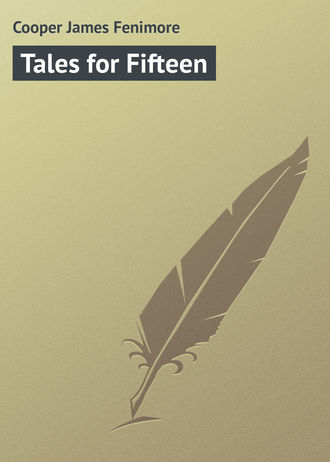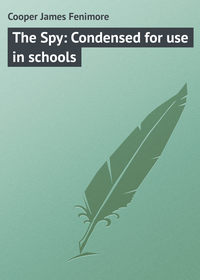 полная версия
полная версияTales for Fifteen
Charlotte was but seventeen, yet the customs of the country, and the temptations of her expected wealth, together with her own attractions, had already placed her within the notice of the world. But no symptom of that incipient affection which was to govern her life, could either of her parents ever discover; and in the exhibitions of her attachments, there was nothing to be seen but that quiet and regulated esteem, which grows out of association and good sense, and which is so obviously different from the restless and varying emotions that are said to belong to the passion of love.
Maria Osgood was a distant relative, and an early associate, who, although as different from her cousin in appearance and character as black is from white, was still dear to the latter, both from habit and her unconquerable good nature.
George Morton, the youth of whom such honourable mention has been made, was the son of a gentleman who had long resided in the next dwelling to Mr. Henly in the city, and who also possessed a country house near his own villa. These circumstances had induced an intimacy between the families that was cemented by the good opinion each entertained of the qualities of the other, and which had been so long and so often tried in scenes of happiness and misery, that were known to both. Young Morton was a few years the senior of Charlotte; and, at the time of commencing our tale, was but lately released from his collegiate labours. His goodness of heart and simplicity of manners made him an universal favourite; while the peculiarity of their situation brought him oftener before the notice of Charlotte than any other young man of her acquaintance. – But, notwithstanding the intimation of Maria Osgood, none of their friends in the least suspected any other feeling to exist between the youthful pair than the natural and very obvious one of disinterested esteem. As the family seated themselves at the dinner table, their guest exclaimed, in the heedless way that characterised her manner —
"Oh! Mrs. Henly, I have to congratulate you on the prospects of your soon having a son, and one as amiable and attractive as your daughter."
"Indeed!" returned the matron, comprehending the other's meaning intuitively, "and what may be the young gentleman's name?"
"You will be the envy of all the mothers in town," continued Maria, "and deservedly so. Two such children to fall to the lot of one mother! – Nay, do not shake your head, Charlotte; it must and shall be a match, I am determined."
"My friendship for you would deter me from the measure, should nothing else interfere," said Charlotte, good humouredly.
"Ah! I have already abandoned my pretensions – twelve brothers and sisters, my dear, are a dreadful addition to bring into a family at once!"
"I am sure I do not think so," returned Charlotte, timidly glancing her eye at her mother; "besides, I feel bound in honour to remember your original intention."
"I tell you I have abandoned it, with all thoughts of the youth."
"And who is the youth?" asked Mrs. Henly, affecting an indifference that she did not feel.
"You will have the handsomest son in the city, certainly," said Maria; "and, possibly, the richest – and the most learned – and, undeniably, the most admired!"
"You quite excite my curiosity to know who this paragon can be," said the mother, looking at her husband, who returned the glance with one of equal solicitude.
"I do not think he is more than four and twenty," added Maria; "and his black eyes would form a charming contrast to your blue ones."
"To whom does Miss Osgood allude?" asked Mrs. Henly, yielding to a solicitude that she could no longer controul.
"To Mr. Seymour Delafield," said Charlotte, raising her mild eyes to the face of her mother, and smiling, as she delicately pared her apple, with a simple ingenuousness that banished uneasiness from the breast of her parent in an instant.
"I know him," said Mr. Henly; "but I did not think you had ever seen him, Charlotte."
"We met him in our morning walk, sir, and Maria introduced him."
"He is thought to be very handsome," continued her father, helping himself to a glass of wine while speaking.
"And very justly," returned the daughter; "I think him the handsomest man that I have ever seen."
"Have I your permission for telling him so?" cried Maria, with a laugh.
"I have not the least objection to his knowing it, on my own account, except from the indelicacy of complimenting a gentleman," said Charlotte, with perfect simplicity; "but whether it would be beneficial to himself or not, you can best judge."
"You think him vain, then?" observed her mother.
"Not in the least; or, rather, he did not exhibit it to me" – was the answer, with the same open air as before.
"He has also a great reputation for good sense," continued her father, avoiding the face of his child.
"I thought he had wit, sir."
"And not good sense?"
"Am I a judge?" asked Charlotte, rising, and holding a lighted paper to her father, while he took a new segar. Her clear blue eyes resting on him in the fulness of filial affection, as she performed this office, and the open air with which she bent forward to receive the kiss he offered in thanks, removed any apprehensions which the name of their morning's companion might have excited.
Mr. Henly knew nothing concerning this young man that would induce him at all to avoid the connexion, but still he had not yet examined his character with that searching vigilance that he thought due to the innocence and merit of his child. Determining within himself, however, that this was a task that should no longer be neglected, he rose, and telling the ladies that he left the bottle with them, withdrew to his study.
The door had hardly closed behind Mr. Henly, when George Morton entered the dining parlour, with the freedom of an old and favourite friend, and telling Mrs. Henly that, in consequence of his family's dining out, and his own engagements, he was fasting, and begged her charity for a meal. From the instant that he appeared, Charlotte had risen with alacrity, and was no sooner acquainted with his wants, than she rung to order what he required. She brought him a glass of sparkling wine with her own hands, and pushing a chair nearer to the fire than the one he occupied, she said —
"Sit here, George, you appear chilled – I thought you would miss your coat."
"I thank you," returned the youth, turning on her an eye of the most open affection; "I do feel unusually cold, and begin to think, that with my weak lungs it would have been more prudent to have taken a surcout."
"And how was the poor man when you left him?"
"Much better, and in extremely good quarters," said George; but, turning quickly to Miss Osgood, he added, "So, Miss Maria, your beau has condescended to walk with you at last?"
"Yes, Mr. Impudence," said Maria, smiling; "but come, fill your mouth with food, and be silent."
He did as requested, and the conversation changed.
CHAPTER II
Notwithstanding the plenteous gifts which Providence had bestowed on the parents of Maria in the way of descendants, Fortune had sufficiently smiled on his labours to enable him to educate them in what is called a genteel manner, and to support them in a corresponding style. The family of Mr. Osgood exhibited one of those pictures which are so frequent in America, where no other artificial distinctions exist in society than those which are created by wealth, and where obscurity has no other foe to contend with than the demon of poverty. His children were indulged in luxuries that his death was to dissipate, and enjoyed an opulence that was only co-existent with the life of their parent. Accordingly, the music party that assembled on the following evening at the house of Mr. Osgood, was brilliant, large, and fashionable. Seven grown-up daughters was a melancholy sight for the contemplation of the parents, and they both felt like venders of goods who were exhibiting their wares to the best advantage. The splendid chandeliers and lustres of the drawing-room were lighted for the same reason as the lamps in the glittering retail stores of Broadway; and the brilliant effect of the taste of the young ladies was intended much like the nightly lustre of the lottery-offices, to tempt adventurers to try their chances. From this premeditated scheme of conquest we ought, in justice, however, to except Maria herself, who, from constitutional gayety and thoughtlessness, seldom planned for the morrow; and who, perhaps, from her association with Charlotte, had acquired a degree of disinterestedness that certainly belonged to no other member of her family.
Whatever were the views of the family in collecting their friends and acquaintances on this important evening, they were completely successful in one point at least; for, before nine, half the dilettanti of the city were assembled in Greenwich-street, in a most elaborate state of musical excitement. Charlotte Henly, of course, was of the party, although she was absolutely ignorant of a single note, nor knew how to praise a scientific execution, or to manifest disgust at simple melody. But, her importance in the world of fashion, and her friend Maria, obtained her a place. There was a reason that secretly influenced Charlotte in electing her evening's amusement, that was not known, however, even to her friend. – George Morton played on the German flute in a manner that vibrated on her nerves with an exquisite thrill that she often strove to conquer, and yet ever loved to indulge. His musical powers were far from being generally applauded, as they were thought to be deficient in compass and variety; but Charlotte never descended to criticism in music. She conceived it to be an enjoyment for the senses only, or, rather, she thought nothing about it; and if the sounds failed to delight her, she unhesitatingly attributed the circumstance to an absence of melody. It was to listen to the flute of George Morton, then, that the drawing-room of Mrs. Osgood was adorned with the speaking countenance of Miss Henly.
Among the guests who made an early appearance in this "Temple of Apollo," was the youth who had attended the ladies in their walk. Seymour Delafield glanced his eye impatiently around the apartment, as soon as he had paid the customary compliments to the mistress of the mansion and her bevy of fair daughters; but a look of disappointment betrayed the search to be an unsuccessful one. Both the look and the result were noticed by Maria; and, turning a glance of rather saucy meaning on the gentleman, she said —
"I apprehend your flute, which, by the by, I am glad to see you have brought, will be rather in the penseroso style this evening, Mr. Delafield."
"Unless enlivened by the contagious gayety of your smile," returned Delafield, endeavouring to look excessively unconcerned; "but" —
"Oh! my very laugh is musical, I know," interrupted Maria; "but then it is often shockingly out of time."
"It seldom fails to produce an accompaniment," said the gentleman, now smiling in reality; "but" —
"Where is Charlotte Henley?" said the young lady, again interrupting him; "she has a perfect horror of the tuning of fiddles and the preparatory thrummings on the piano; so endeavour to preserve the harmony of your temper for the second act."
"Well! it is some relief to know she is coming at all," cried Seymour, quickly; and then, recovering himself, with perfect breeding, he added – "for one would wish to see you as happy as all your friends can make you, on such an occasion."
"I am extremely indebted to your unbounded philanthropy," said Maria, rising and courtseying with great gravity; "do not doubt of its being honourably mentioned at" —
"Nay, nay," cried the youth, colouring and laughing, "you would not think of mentioning my remarks to" —
"At the next meeting of the Dorcas Society, of which I am an unworthy member," continued Maria, without listening to his remonstrance.
Seymour Delafield now laughed without any affectation – and exchanging a look of perfect consciousness of each other's meaning, they separated, as the preparations for the business of the evening were about to commence. For a short time there was a confusion of sounds that perfectly justified the absence of Miss Henly, when the music began in earnest. Within half an hour, Mr. Delafield, who had suffered himself to be drawn to the back of the chair of a professed belle, turning his head to conceal a yawn that neither the lady's skill nor his good manners could repress, observed Charlotte sitting quietly by the side of her friend. Her entrance had been conducted with such tact, that had she possessed the most musical ear imaginable, it were impossible to disturb the party less; a circumstance that did not fail to impress Seymour agreeably, from its novelty. He moved to the side of the fair vision that had engrossed all his thoughts since the moment they had first met, and took the chair that the good nature of Miss Osgood offered to his acceptance between them.
"Thank fortune, Miss Henly," he said, the instant he was seated, "that bravura has ceased, and I can now inquire how you recovered from the fatigue of your walk?"
"I suffered no fatigue to recover from," replied the lady, raising her eyes to his with an expression that told the youth he had better talk straight forward at once; "I walk too much to be fatigued with so short an excursion."
"You came here to favour us with your skill on the harp, Miss Henly?"
"No."
"On the piano?"
"On neither – I play on nothing."
"You sing, then?"
"Not at all."
"What! not with that voice?" exclaimed the young man, in surprise.
"Not with this voice, and surely with no other."
Seymour felt uneasy, and, perhaps, disappointed. He did not seem to have roused a single sensation in the breast of his companion, and it was seldom that the elegant possessor of three hundred thousand dollars failed to do so, wherever he went, or whatever he did. But, in the present instance, there was nothing to be discerned in the countenance or manner of Charlotte that indicated any thing more than the sweetness of her nature and the polish of her breeding. He changed the subject.
"I hope your friend did not suffer yesterday from his humanity?"
"I sincerely hope so too," said Charlotte, with much simplicity, and yet with a good deal of feeling.
"I am fearful that we idle spectators," continued the gentleman, "suffered in your estimation, in not discovering equal benevolence with Mr. Morton."
Charlotte glanced her mild eyes at the speaker, but made no reply.
"Your silence, Miss Henly, assures me of the truth of my conjecture."
"You should never put a disagreeable construction on the acts of another," said Charlotte, with a sweetness that tended greatly to dissipate the mortification Mr. Delafield really felt, at the same time that he was unwilling to acknowledge it, even to himself.
They were now again interrupted by the music, which continued some time, during which George Morton made his appearance. His coat close buttoned to his throat, and an extra silk handkerchief around his neck, which he removed only after he entered the apartment, immediately arrested the attention of Charlotte Henly. Turning to Maria, she said, in those tones of real interest that never can be mistaken for manner —
"I am afraid that George has suffered from his exposure. Do not ask him to play, for he will be sure to comply."
"Oh! the chicken has only taken cold," cried Maria; "If he does not play, what will you do? you came here to hear him only."
"Has Miss Henly ears for no other performer, then?" asked Seymour Delafield.
"Miss Henly has as many ears as other people," said Maria, "but she does not condescend to use them on all occasions."
"Rather say," cried Charlotte, laughing, "that the want of taste in Miss Henly renders her ears of but little use to her."
"You are not fond of music, then?" asked the youth, a little vexed at thinking that an accomplishment on which he prided himself would fail to make its usual impression.
"Passionately!" exclaimed Charlotte; then, colouring to the eyes, she added, "at least I sometimes think so, but I believe I am thought to be without taste."
"Those who think so must want it themselves," said Seymour, in a low voice; then, obedient to the beck of one of the presiding nymphs, he hastened to take his share in the performance.
"Now Charlotte, you little prude," whispered her friend, the instant he withdrew, "is he not very, very handsome?"
"Very," said Charlotte; "more so than any other gentleman I have ever seen."
"And engaging, and agreeable, and gentlemanlike?"
"Agreeable, and gentlemanlike too.
"And graceful, and loveable?"
"Graceful, certainly; and, very possible, loveable, to those who know him."
"Know him! – what more would you know of the man? You see his beauty and elegance – you witness his breeding – you listen to his sense and information – what more is necessary to fall in love with him?"
"Really, I pretend to no reasoning upon the subject at all," said Charlotte, smiling; "but if you have such an intention, indulge in it freely, I beg of you, for you will not find a rival in me. – But, listen, he is about to play a solo on his flute."
A man with three hundred thousand dollars may play a solo, but he never can be alone where there are any to listen. The hearts of many throb at the very breathings of wealth through a flute, who would remain callous to the bitterest sighs of poverty. But Delafield possessed other attractions to catch the attention of the audience: his powers on the instrument greatly exceeded those of any of his competitors, and his execution was really wonderful; every tongue was silent, every ear was attentive, and every head nodded approbation, excepting that of our heroine. Delafield, perfectly master of his instrument and the music, fixed his eye on the countenance of Charlotte, and he experienced a thrill at his heart as he witnessed her lovely face smiling approbation, while his fingers glided over the flute with a rapidity and skill that produced an astonishing variety and gradation of sounds. At length, thought he, I have succeeded, and have made an impression on this charming girl that is allied to admiration. The idea gave him spirits for the task, and his performance exceeded any thing the company had ever witnessed before. On laying down the instrument, he approached the place where the friends were sitting, with an exultation in his eyes that was inferior only to modesty in the power to captivate.
"Certainly, Mr. Delafield," cried Maria Osgood, "you have outdone your own outdoings."
"If I have been so fortunate as to please here, then I am rewarded indeed," said the youth, with a bow and an expression that rendered it a little doubtful to which of the ladies the compliment was addressed. At this instant, George Morton approached them.
"Mr. Delafield, let me make you acquainted with Mr. Morton," said Maria, glancing her eye at the former in a manner that he understood.
"I have great pleasure in taking Mr. Morton by the hand," said Seymour, "if he will excuse the want of ceremony in this company. The lesson that you gave to me yesterday, sir, will not soon be forgotten."
"In what manner, sir?" inquired George, with a little embarrassment and a conscious blush.
"In teaching me, among others, Mr. Morton, the difference between active and passive humanity – between that which is satisfied with feeling, and that which prompts to serve."
To this unexpected compliment young Morton could do no more than bow in silence, for it was too flattering for a reply – and too true to deny. As Delafield turned his eye, at a little loss to know whether to be pleased or not with his own humility, he met a look from Charlotte that more than rewarded him for the effort. It was a mild, benevolent, pure glance, that spoke admiration and heartfelt pleasure. He forgot his solo, and the expected compliments; and, for the rest of the evening, that thrilling expression floated in his brain, and was present to his thoughts; it was worth a thousand of the studied glances that were continually aimed at him from all sides of the room, and with every variety of eye – from the piercing black, to the ogling gray. It was a look that came directly from, and went to, the heart. If young ladies always knew how nicely nature has qualified the other sex to judge of their actions, what multitudes of astonishingly expressive glances, and artfully contrived gestures and movements, would sink down into looks, that indicated feelings and motives, that were adapted to the occasion! What trouble in creating incidents that might draw out charms would be avoided! And, in short, how much extra labour, both of body and mind, would be spared!
This agreeable contemplation of Mr. Delafield was soon interrupted by the cheerful voice of Maria Osgood, who cried —
"Bless me, George, you really do look ill."
"It is seldom that I have much health to boast of," replied the youth, in a feeble voice, and with a still feebler smile.
"But," said Maria, without reflecting, "you look worse than usual."
There was so much truth in this remark, that the young man could only smile in silence, while Seymour, surveying the very plain exterior of his new acquaintance, turned his eyes with additional satisfaction towards a mirror that reflected his own form from head to feet.
"You will not attempt the flute to-night, George?" said Charlotte.
"I believe I must, or not fulfil my engagement to Mrs. Osgood."
"Surely," continued Charlotte, in a low tone to her friend, "George had better not play, looking so ill as he does."
"Certainly not; besides, his performance would not shine after that of Mr. Delafield."
Seymour overheard this speech, which was really intended only for the ear of Charlotte, and he was instantly seized with an unaccountable desire to hear the flute of Mr. Morton. Seymour was conscious that he played well, and could he have forgotten the indifference that Miss Henly exhibited to his performance, would have been abundantly flattered with the encomiums that were lavished on his skill.
A request from the mistress of the mansion now compelled George to make his appearance among the musicians, and in a few minutes his flute was heard alone. There was a vacancy in the looks of Charlotte, during the scientific execution of the different individuals who had been labouring at the several instruments in the course of the evening, that denoted a total indifference to the display. But, the moment that George was called on to take his part in the entertainment, this listlessness disappeared, and was succeeded by an expression of intense interest and deep anxiety. The melody of George was simple and plaintive; he aimed at no extraordinary exhibition of skill, and it was difficult to compare his music with that of Seymour. The latter, however, studied the countenance of the young lady near him as the best index to their comparative merit, and he was soon able to read his own want of success. For the first few minutes, anxiety was the principal expression portrayed in her lovely face, but it was soon succeeded by a deep and powerful emotion. There is something contagious in the natural expression of our passions, that insensibly enlists the sympathies of the beholder – and Seymour felt a soft melancholy stealing over him as he gazed, that was but a faint reflection of the tenderness excited in the breast of Charlotte, while she listened to sounds that penetrated to her very soul. There is no mistaking the effect of music that depends only on its melody. Its appeal to the heart is direct and unequivocal, and nothing but callous indifference can resist its power. The most profound silence pervaded the apartment, and George was enabled to finish his piece with a spirit that increased with the attention. As the last breathing notes died on the ear, Delafield turned to meet those eyes which had already secured an unconscious victory, and saw them moistened with a lustre that added to their natural softness. Beauty in tears is proverbially irresistible – and the youth, bending forward, said in a voice that was modulated to the stillness of the room —
"Such melody, Miss Henly, captivates the senses."
"Does it not touch the heart?" asked the young lady, with a little of unusual animation.









